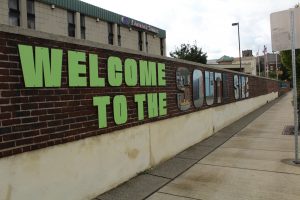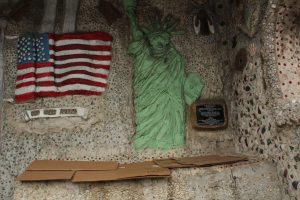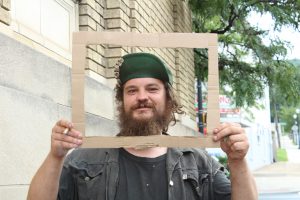https://drive.google.com/file/d/0B8tOHqRBhENbelhKMmx4QTIzWUE/view
https://drive.google.com/file/d/0B8tOHqRBhENbelhKMmx4QTIzWUE/view
From its elaborate murals to its eccentric music venues, the Southside of Bethlehem PA has come to be praised for its artistic qualities. Often referred to as the arts district of the Lehigh Valley, the Bethlehem Southside is home to many musical venues, unique restaurants, and community centers for the arts. I would love to explore this aspect of the Valley in a documentary. Specifically, I would love to explore the history of how the Southside has come to be an artistic center point. Furthermore, I want to discover the dynamics of the arts scene today and how they affect people who live in this community. I want to answer questions like who makes up the arts scene, what music is most popular, and how does the art scene impact the community? I am very into music and art and I think it would be cool learn about the scene in this area.
Long Line: I want to make a documentary about the art scene in the Lehigh Valley. I want to focus on the Southside of Bethlehem and explore how the art of scene has affected the culture and lives of the occupants there.
Trying to quickly take a photo of a person that entirely captures their personality is no easy feat. Add the extra challenge of never having met the person and this task begins to seem nearly impossible. Although I feel that I often overlook it, individuality should truly be regarded with awe. The complexities that compromise an individual appear to be infinite. People are so variable and how they are viewed in eyes of the others they have encountered is also extremely variable. It is for these reasons that I become slightly agitated when my mother reminds me of her desire for me to “stay true to myself”. I feel as though she wants my decisions in college and life to be based on some previous version of self; a version of me she favored. However, I often question if I would be committing an injustice against myself for making a decision that I heavily agree with today that I younger or previous me would not agree with. Ultimately, I feel that this idea relates to one of the bigger, more abstract, and angsty questions, “who I am I?”. This is a question that I have not been able to answer for myself. I feel that individuals are always changing on all bases and thus it’s hard to represent all that a person is through any medium.
In terms of documentaries, perhaps this can be applied to how we analyze the information we receive from other people. Donald Glover once said in an interview that he does not want others to think of the thoughts and emotions he expresses in his music as static. Rather, he talks about what he experiences for brief moments of time. For instance, if he writes about being depressed and angry because of racism, this does not mean his entire life is centered on him being pissed off all the time because of racism. He just feels this way at times. While this seems rather obvious, this is something that I often overlook in documentaries. For example, if someone told me how much they love their community in a documentary that supports the idea that their community is great, I might see this person’s prospective as static. However, application of the previously mentioned ideas might lead me to understand that this person might not always be in favor of her community and question what provoked her to answer the way she did when she was interviewed for the film.
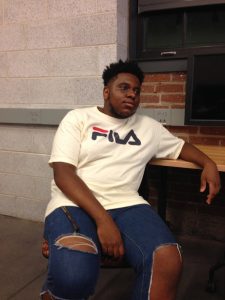
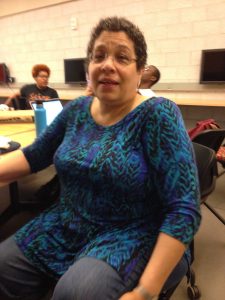
As I began walking from Lehigh’s campus down towards 4th Street with a flimsy cardboard frame in hand an overwhelming feeling came over me that I had not anticipated. When I had previously thought about what I might feel or experience when I set out to perform this experiment, I had imagined that I would see the world in completely different light. I imagined deeper greens in leaves, a bluer sky, and a rediscovery of the beauty of our world. I expected brief a rush of feelings of gratefulness and love. However, when I made my first left onto the busy streets of South Bethlehem and held my frame in front of my face all I could pay attention to was the judging eyes of others around me. I felt insecure. I realized how odd I had looked.
As one might assume, my highly romantic expectations about how I might after completing this assignment were not really met. From a visually standpoint, everything looked relatively the same. The only discrepancy was the giant poorly constructed frame that obstructed my every view. However, despite my slight disappointment resulting from my poor assumptions, I still feel that I took a lot away from this assignment.
The frame did not change necessary magnify the beauty of what I saw, but it did change how I perceived my surroundings in two ways. Firstly, walking with the frame really called me to slow down and really notice the special qualities of my environment. It stopped to notice the diversity in the people in both class and race, I realized the details in the architecture of the buildings, and I took note of smells and sounds gave the environment new life. Secondly, doing this assignment gave me new opportunity and to reimagine the city in a new life. I could see every shot as a smaller part of a bigger fictional story. Joggers became secret agents in pursuit of stopping evil and statues outside of the Banana Factory became relics of the dead in a horror film. I feel that this experience caused me to think a bit about how prospective and information can really shape a story.
In hindsight, I realized that the people who stared at me were missing the larger picture. Walking around with a cardboard in front of my face was not all that was weird about this assignment. What was truly weird was that I was taking a moment to really take in and understand the scenes of everyday life in South Bethlehem. This is not something I do often enough.
Watching The Grizzly Man in class caused me to question some of the traditional ideas that I associate with documentaries. I often forget that all a documentary is, is an account of nonfictional events through film. I typically think about them as textbooks made into movies. That is, I view them as well researched compilations of knowledge by experts on a specific topic or in a specific field. The topics are usually either quite large or serve some biographical purpose. Many documentaries I’ve also aim to provide a historical account of some event. The Grizzly Man does not necessarily go against my ideas of what a documentary should but the film certainly does challenge them. The film centers on this goofy guy who spends a large portion of his life recording his experiences living amongst bears. The film seems to center on the questions of the man’s sanity and whether his work with the bears truly helped ensure their survival. The scenes, events, and organization greatly extend what I believe to be typical in documentary. This makes me excited to create these types of films and has opened my imagination to the frameworks of documentary.
My introduction into creating film came during my senior year of high school when some of my friends and I started a band. We shot a couple of cringey music videos for our cover songs and posted them YouTube hoping to gain a bit exposure. That project died the summer we all went away for college. Before high school ended, however, a smaller group of friends and I shot a short film for a school project. It lacked a formal script, the shots were over-exposed, and the acting was unintentionally comedic. But it was a story that someone could follow and understand without a lot of mental strain. We were proud of it.
It was not until last year that I started making films of my own. So far, I have only ventured into making documentaries. I’ve made films about interracial relationships and Greek culture at Lehigh University. I have also helped another student make a film about major choices. These projects all started off as questions that I needed to know the answers too. I was extremely passionate about getting to discuss a topic and using those discussions to inspire other people to think a little bit more about issues that aren’t always obvious.
I mention my previous film making experience in this post primarily because of how much those experiences differ from the one I had in class last Monday. Up until that lecture, all the projects I made were ignited by some self-initiated aspiration to learn and have fun. Every time I shot, I felt like I was journeying into a new adventure. In class, all I could focus on was getting the project done. Me nor my fellow group members seemed to really care much about the movie was about. We had a limited amount of time and just wanted something presentable.
I found this project to be mechanical. There was no love or passion in what I was doing. I had fun overall, but did not care about the work I was creating. I realized going forward that I only want to work on film projects that I really care about. The more positive side of what I gained from this experience was a sort of deconstruction of film as this a grandeur thing. I am beginning to see it more as tool to convey my thoughts and ideas to an audience.
